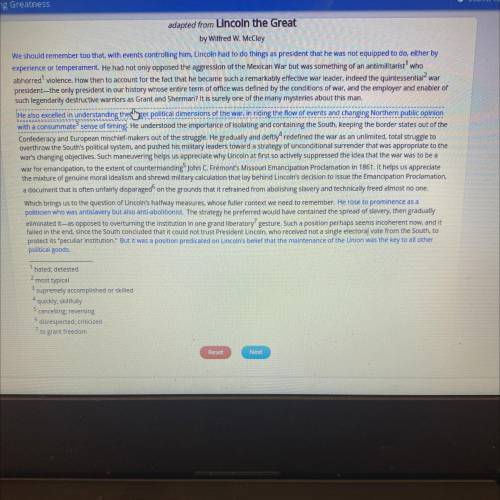Adapted from Lincoln the Great
by Wilfred W. McClay
We should remember too that, with events...

English, 20.10.2021 09:20 aaburto1515
Adapted from Lincoln the Great
by Wilfred W. McClay
We should remember too that, with events controlling him, Lincoln had to do things as president that he was not equipped to do, either by
experience or temperament. He had not only opposed the aggression of the Mexican War but was something of an antimilitarist' who
abhorred' violence. How then to account for the fact that he became such a remarkably effective war leader, indeed the quintessential war
president-the only president in our history whose entire term of office was defined by the conditions of war, and the employer and enabler of
such legendarily destructive warriors as Grant and Sherman? It is surely one of the many mysteries about this man.
He also excelled in understanding the larger political dimensions of the war, in riding the flow of events and changing Northern public opinion
with a consummate sense of timing. He understood the importance of isolating and containing the South, keeping the border states out of the
Confederacy and European mischief-makers out of the struggle. He gradually and deftly redefined the war as an unlimited, total struggle to
overthrow the South's political system, and pushed his military leaders toward a strategy of unconditional surrender that was appropriate to the
war's changing objectives. Such maneuvering helps us appreciate why Lincoln at first so actively suppressed the idea that the war was to be a
war for emancipation, to the extent of countermanding John C. Fremont's Missouri Emancipation Proclamation in 1861. It helps us appreciate
the mixture of genuine moral idealism and shrewd military calculation that lay behind Lincoln's decision to issue the Emancipation Proclamation,
a document that is often unfairly disparaged on the grounds that it refrained from abolishing slavery and technically freed almost no one.
Which brings us to the question of Lincoln's halfway measures, whose fuller context we need to remember. He rose to prominence as a
politician who was antislavery but also anti-abolitionist. The strategy he preferred would have contained the spread of slavery, then gradually
eliminated it-as opposed to overturning the institution in one grand liberatory' gesture. Such a position perhaps seems incoherent now, and it
failed in the end, since the South concluded that it could not trust President Lincoln, who received not a single electoral vote from the South, to
protect its "peculiar institution. But it was a position predicated on Lincoln's belief that the maintenance of the Union was the key to all other
political goods.
hated; detested
2 most typical
supremely accomplished or skilled
4 quickly, skillfully
5 cancelling reversing
disrespected, criticized


Answers: 2
Another question on English

English, 21.06.2019 22:00
Read this passage from william faulkner's the sound and the fury: i says no i never had university advantages because at harvard they teach you how to go for a swim at night without knowing how to swim and at sewanee they dont even teach you what water is. i says you might send me to the state university; maybe i'll learn how to stop my clock with a nose spray and then you can send ben to the navy i says or to the cavalry anyway, they use geldings in the cavalry. which best describes the narrator's tone in this passage? a. bitter b. angry c. sarcastic d. all of the above
Answers: 1

English, 22.06.2019 04:50
How did the language of the gettysburg address differ from the language in the secondary source about this speech?
Answers: 1

English, 22.06.2019 07:30
What is the victorian theme in the poem “beautiful city” by alfred, lord tennyson? beautiful city, the centre and crater of european confusion, o you with your passionate shriek for the rights of an equal humanity, how often your re-volution has proven but e-volution roll’d again back on itself in the tides of a civic insanity! a. civil unrest b. revolution c. confusion d. social justice
Answers: 1

English, 22.06.2019 09:50
Write a speech about a current practice - anything people commonly do in society today - that you think the people of the future will see as a form of discrimination. what are some practices that are legal today that you think limit people's rights? do you yourself feel you're being treated unfairly? you'll support your ideas with evidence you find through research. you'll also enhance your speech with audio or video.
Answers: 1
You know the right answer?
Questions

Mathematics, 23.08.2019 04:40

Mathematics, 23.08.2019 04:40

Biology, 23.08.2019 04:40









Mathematics, 23.08.2019 04:40






History, 23.08.2019 04:40

History, 23.08.2019 04:40

Mathematics, 23.08.2019 04:40



